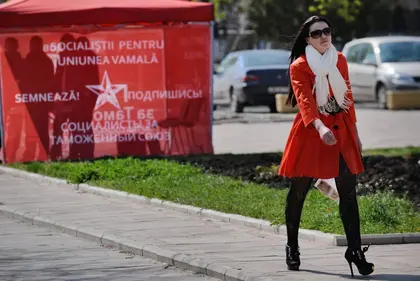Gagauzia
The Kremlin is likely setting conditions to intensify its hybrid operations against Moldova.
JOIN US ON TELEGRAM
Follow our coverage of the war on the @Kyivpost_official.
Kremlin-affiliated governor of the pro-Russian Moldovan autonomous region of Gagauzia Yevgenia Gutsul told Kremlin newswire TASS on April 26 that Moldovan law enforcement officials detained her and three of her advisors for several hours when the group arrived at the Chisinau airport after a series of recent meetings in Russia and Turkey.
Gutsul claimed that Moldovan law enforcement inspected her luggage and detained her for an hour before releasing her, and one of Gutsul’s advisors told TASS that Moldovan authorities interrogated the three advisors for an additional two hours. It is unclear if Moldovan authorities formally detained Gutsul and her advisors.
TASS reported that a group of 100 people gathered outside the airport to welcome Gutsul and chanted “Victory” when Gutsul exited the airport, likely referring to Gutsul’s position as the newly formed pro-Russian Moldovan Victory electoral bloc’s executive secretary.
Gutsul claimed that Moldovan authorities are making every effort to humiliate her and other pro-Russian Moldovans and framed Moldovan authorities’ recent confiscation of over one million dollars from Kremlin-linked Moldovan opposition politicians as a “biased” effort to humiliate innocent Moldovans.
Gutsul and other pro-Kremlin actors will likely continue to seize on short-term detentions and legitimate efforts by the Moldovan government to defend itself against Russian hybrid operations to justify further Russian aggression towards Moldova.

ISW Russian Offensive Campaign Assessment, June 28, 2024
Promotion of Russian narratives
The Moldovan government is also taking steps to address known Russian information operations aimed at Gagauzia. The Moldovan Audiovisual Council announced on April 26 that it fined two regional and local television (TV) stations in Gagauzia, “TV-Gagauzia” and “ATV,” 100,000 Moldovan lei ($5,627) for spreading disinformation, hate speech, and not ensuring “information security” with their broadcasts.
The Audiovisual Council determined that the TV stations provided a platform for public figures to spread symbols and messages intended to “fortify a divergence” between Gagauzia's connection to Moldova and its alleged proximity to the Russkyi Mir (Russian World).
The Audiovisual Council reported that the TV stations amplified narratives justifying Gagauzia’s theoretical future secession from Moldova, accusing Moldova of losing its sovereignty and traditional family values, and equating Moldova’s future accession to the European Union (EU) or NATO with “war.”
ISW has extensively reported on the Kremlin’s use of its Russian World framework — an intentionally vague ideological and geographic idea that includes any former territory of the Kyivan Rus, the Kingdom of Muscovy, the Russian Empire, the Soviet Union, and the contemporary Russian Federation and the inhabitants of those territories - to justify Russian aggression under the guise of ”protecting” Russian “compatriots abroad” in Russia’s “historical territories.”
Russian President Vladimir Putin noted during his annual New Year’s address on Dec. 31, 2023, and has since reiterated that 2024 is the “Year of the Family” for Russia and has since pursued domestic policies aimed at strengthening Russia’s “traditional family values.”
The Gagauzian TV stations’ efforts to equate the EU and NATO with “war” are also in line with the Kremlin’s informational efforts to justify Russia’s ongoing military reforms and invasion of Ukraine as a response to inherently escalatory actions by NATO and the EU and in preparation for the Kremlin’s envisioned long-term existential conflict with the West.
The Kremlin will likely continue to disseminate known narratives in Moldovan society through a variety of means and may intend to use the newly-formed Victory electoral bloc to amplify its narratives.
New provocations in Transnistria
Russian peacekeeping forces conducted another undisclosed training exercise in the Russian-backed Moldovan breakaway republic of Transnistria, likely aimed at creating unease in Moldovan society and increased tension in the already fraught relationship between Chisinau and Tiraspol.
The Moldovan Bureau of Reintegration reported on April 23 that Russian peacekeeping forces violated the Organization for Security and Cooperation in Europe (OSCE) Joint Control Commission (JCC) protocols by conducting training exercises to “repel attacks on the positions of peacekeeping forces” near four settlements in Transnistria on April 23 without coordinating with Moldovan authorities.
Moldovan authorities called the incident a “provocation” and a violation of the founding acts of the peacekeeping mission and stated that the incident would be discussed at the next JCC meeting.
Transnistrian Foreign Minister Vitaly Ignatiev claimed on April 25 that the peacekeeping exercises were “justified” and “necessary” to ensure the combat readiness of Russian peacekeeping units. Moldovan authorities previously urged the JCC to conduct an investigation into Russian peacekeepers’ use of undisclosed drones and weapons during a December 2023 training exercise, another violation of JCC protocols.
See the original here.
You can also highlight the text and press Ctrl + Enter






